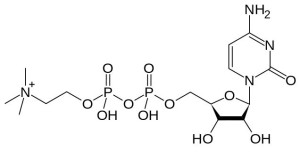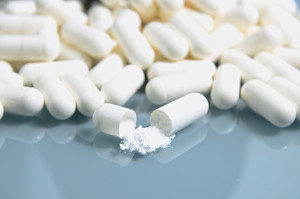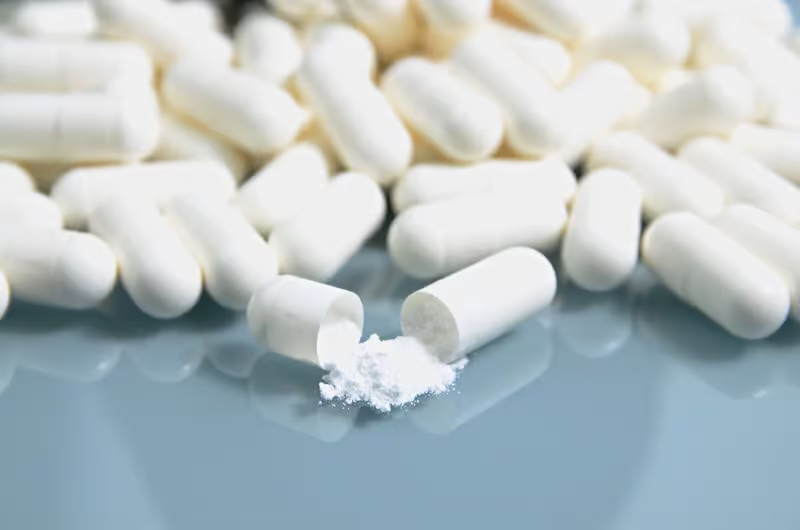Table of Contents
CDP-Choline (Cytidine Diphosphate Choline or cytidine 5′-diphosphocholine) is also known as Citicoline. This naturally occurring choline source is present in every cell in your body.
CDP-Choline is unique as a choline source. Once it’s digested it separates into cytidine and choline. When it gets to your brain it converts back to CDP-Choline.
This choline is needed to synthesize the neurotransmitter acetylcholine (ACh). ACh is a primary neurotransmitter released by neurons. This electrical signaling between neurons is involved in memory, learning, cognition and recall.
Cytidine is a component of Ribonucleic acid (RNA). This molecule is involved in coding, decoding, regulation and the expression of genes. But once it gets into the brain, it converts to uridine.
The signaling going on between neurons tends to grab choline molecules from cell membranes when choline is in short supply. This is where uridine steps in. It repairs those same cell membranes. To maintain neuron integrity.
CDP-Choline helps:
- Brain Optimization: CDP-Choline provides uridine once it enters in the brain. Uridine repairs, rebuilds and re-supplies the components needed for neuron repair. To keep signaling between neurons optimized for memory, learning, cognition and recall.
- Neurotransmitters: CDP-Choline enhances the release of norepinephrine, dopamine, serotonin, and acetylcholine in the brain.[i] [ii]
- Brain Energy: CDP-Choline increases Adenosine triphosphate (ATP) in brain cells. ATP is produced in your mitochondria and your main source of cellular energy.
Overview
CDP-Choline is a type of choline that is present in every cell in your body. You can also get it from eating organ meats like liver.

Choline is considered an essential nutrient because your body uses it faster than it can produce it. So you need to supplement choline either from food or a supplement.
You need choline for the production of the neurotransmitter acetylcholine. And to form phosphatidylcholine (PC), used in building cell membranes.
In fact, choline is so vital to cognition and nerve function that, without it, we couldn’t move, think, sleep or remember anything.
CDP-Choline has the unique ability to convert to cytidine and choline once it passes through your digestive system. After it crosses the blood-brain barrier, it converts back to CDP-Choline.
The left-over cytidine in your blood can convert into uridine in your brain. Uridine is necessary for repairing cell membranes.
CDP-Choline is involved in memory and cognitive functions. And provides energy for the brain to conduct sustained mental effort.
CDP-Choline vs. Alpha GPC vs. Choline Bitartrate: What’s the Difference?
Choline is a water-soluble nutrient similar in composition to B-vitamins. CDP-Choline, Alpha GPC, Choline Citrate and Choline Bitartrate are all sources of choline.
CDP-Choline (cytidine 5′-diphosphocholine): Is about 18% choline by weight and easily crosses the blood-brain barrier. Your body naturally synthesizes choline into CDP-Choline (Citicoline) in your brain.
Taken as a supplement, it’s then converted to cytidine and choline in your gut. Once it crosses the blood-brain barrier it’s converted back to CDP-Choline. The choline then assists cell membranes, and helps create acetylcholine.
 The added benefit of CDP-Choline is with cytidine. Cytidine can convert into uridine which is critical in the brain. Uridine is needed to synthesize the phosphatidylcholine (PC) in neuron membranes. It helps repair neurons.
The added benefit of CDP-Choline is with cytidine. Cytidine can convert into uridine which is critical in the brain. Uridine is needed to synthesize the phosphatidylcholine (PC) in neuron membranes. It helps repair neurons.
Choline Bitartrate: An economical form of choline, and about 40% choline by weight. So 1 gram of Choline Bitartrate offers 400 mg of actual choline. It does not easily cross the blood-brain barrier. So you won’t experience the same level of nootropic benefits as with Alpha GPC or CDP-Choline.
Alpha GPC: About 40% choline by weight and easily crosses the blood-brain barrier. Alpha GPC naturally occurs in your brain as a byproduct of phosphatidylcholine (PC). When your brain needs more choline, and the choline floating around in your brain is running low, it breaks down PC from cell membranes. And turns it into Alpha GPC.
Your body and brain loves it when you use Alpha GPC. Because it doesn’t have to cannibalize its own cells to get more choline.
How does CDP-Choline Work in the Brain?
CDP-Choline boosts brain health and function in several ways. But two in particular stand out.
- CDP-Choline is metabolized in the gut wall and liver to form choline and cytidine. Once choline and cytidine cross the blood-barrier they re-synthesize back into CDP-Choline (Citicoline).[iii]
In the brain choline aids in the synthesis of acetylcholine. And the release of dopamine.[iv] Acetylcholine is a neurotransmitter associated with memory and learning.
- CDP-Choline helps repair neural membranes. Choline is a precursor to the neurotransmitter acetylcholine (ACh) in your brain. ACh carries nerve impulses across synapses. And then is broken down by enzymes.
ACh is then reassembled for reuse. But this breakdown/reassembly process isn’t foolproof. Some ACh gets lost in the process. So your brain goes looking for more choline to make ACh.
If there isn’t enough choline in your blood, it gets it from the phosphatidylcholine (PC) that makes up the outside of the cell membrane of your neurons. The PC in the cell membrane releases choline to help make acetylcholine.
When your neurons lose too much choline, they lose integrity. Nerve impulses break down, and cognitive abilities decline.[v]
 Scientists in the lab at MIT showed that this is where uridine steps in. The cytidine in CDP-Choline converts to uridine in your body. And it works as a bridge between choline and neuron membrane synthesis.
Scientists in the lab at MIT showed that this is where uridine steps in. The cytidine in CDP-Choline converts to uridine in your body. And it works as a bridge between choline and neuron membrane synthesis.
Uridine is needed to synthesize the PC in neuron membranes. It is first converted to CDP-Choline. Which is then synthesized into new PC. This new PC can then repair damaged neuron membranes. Membranes that were raided to make acetylcholine.[vi]
How things go bad
As we get older, our brain chemistry and energy metabolism changes. This can happen at any age once we enter our adult years.
↓ Brain cell membranes degenerate
↓ Recall, reaction time and mood diminish
↓ Acetylcholine levels decline[vii]
All of these changes can happen at any age. And our bodies are influenced by the food we eat, what we drink, lifestyle habits, the air we breathe and more.
So CDP-Choline can help for age-related cognitive decline, as well as a student looking to do better in school. By boosting acetylcholine and dopamine. And rebuilding neurons in the brain.
CDP-Choline benefits
Research from hundreds of studies have shown that CDP-Choline will:
- Boost cognition[viii]
- Increase brain energy and speed up formation of brain membranes[ix]
- Boost production of acetylcholine[x]
- Increase blood flow in your brain[xi]
- Offset the harmful effects of stroke[xii]
- Improve memory and learning ability[xiii]
- Boost cognitive performance and memory in Alzheimer’s patients[xiv]
CDP-Choline is water-soluble and quickly enters your brain after you take it. In fact, studies show it has nearly 100% bioavailability in your body. Take it orally or intravenously and your body absorbs the same amount.
Once in your brain it boosts signal transmission, and repairs neurons. CDP-Choline improves your brain function and memory by directly increasing levels of acetylcholine and dopamine. And repairs neurons at the same time.
How does CDP-Choline feel?
The most profound indication of the power of this supplement is with those who have suffered a stroke.
Stroke survivors report that after continued usage of CDP-Choline, most of the noticeable effects of the stroke are gone. Including muscle paralysis and weakness.
 Neurohackers report they are better able to concentrate and focus. And experience a significant boost in cognition.
Neurohackers report they are better able to concentrate and focus. And experience a significant boost in cognition.
You can feel more mentally alert. And you may even ease the fatigue associated with clinical depression by using CDP-Choline.
Some use CDP-Choline as an alternative to the stimulants prescribed for ADHD.
CDP-Choline Clinical Research
In a study at the University of Utah, 75 healthy males were given 250 mg, 500 mg of CDP-Choline, or a placebo. Tests were recorded after 28 days of supplementation.
The adolescent males receiving 250 or 500 mg of CDP-Choline showed improved attention and psychomotor speed. And reduced impulsivity compared to adolescent males who received placebo.
This study indicates CDP-Choline is effective even in younger age groups. And can be particularly helpful to those dealing with ADHD.[xv]
CDP-Choline Enhances Cognition
A study published in Food and Nutrition Sciences assessed the potential cognitive-enhancing effects of Citicoline (CDP-Choline) in healthy, adult women.
This double-blind, randomized, placebo-controlled trial worked with 60 healthy women from 40 – 60 years old. Each volunteer was given a daily dose of 250 mg or 500 mg of Citicoline, or a placebo for 28 days.
The women who took either dose of Citicoline for 28 days showed a significant improvement in cognition.
The researchers suggested that Citicoline may improve attentional performance in middle-aged women. And it might eliminate the attention deficits associated with central nervous system disorders (i.e. ADHD).
CDP-Choline Improves Memory
Researchers in Japan studied 16 men and women who were given either 500 mg or 2000 mg of Citicoline for 6 weeks. Magnetic resonance spectroscopy (MRS) was used to study the brains of the participants at the end of the study.
The research team found ATP in the neurons of those in the study increased by over 14%. And membrane phospholipids were boosted by over 32%. These finding were in specific areas of the brain associated with cognition. And the effect was even more pronounced in the group that received the lower dose of Citicoline.
The researchers concluded that Citicoline supplementation could help prevent cognitive decline associated with aging. Along with an increase in brain energy reserves and utilization. And an increase in the components needed to synthesize and maintain cell membranes.
CDP-Choline Recommended Dosage
Recommended CDP-Choline dosage is 250 – 500 mg per day. Taken no more than twice per day. Two daily doses would be one CDP-Choline dose in the morning, and one in the early afternoon.
If you’re adding CPD-Choline to your stack with a racetam, a typical ratio would be 250 mg of Citicoline to 1 gram of Aniracetam or 4 grams of Piracetam.
CDP-Choline Side Effects
Recommended dosages even for extended periods are considered well-tolerated and safe. While CDP-Choline is considered non-toxic, it is possible to experience toxicity with too much choline in your body.
If you experience trouble sleeping, headache, diarrhea, low or high blood pressure, nausea, blurred vision or chest pain – you should stop using CDP-Choline.
Type of CDP-Choline to Buy
 CDP-Choline is sold in capsule and powder form. Capsules are usually 250 – 500 mg each. 500 mg of CDP-Choline in powder form is equivalent to 2-level 1/8 tsp scoops.
CDP-Choline is sold in capsule and powder form. Capsules are usually 250 – 500 mg each. 500 mg of CDP-Choline in powder form is equivalent to 2-level 1/8 tsp scoops.
Cognizin® is a patented, allergen-free, and water-soluble form of CDP-Choline shown in clinical trials to boost brain cell membrane formation by 26%. And increase brain energy by 13.6%.[xvi]
CDP-Choline is often found in pre-formulated nootropic stacks. But as Cognizin® is only offered in premium stacks.
You get an effective 250 mg Citicoline in Click for Mind Lab Pro® including effective doses of 10 brain enhancing nootropic compounds.
I recommend Mind Lab Pro® because it addresses all aspects of anxiety, memory and cognitive enhancement, stabilizes mood, brain repair, and maintenance. See my full Mind Lab Pro review for more.
Nootropics Expert Recommendation
I recommend using CDP-Choline as a nootropic supplement.
CDP-Choline is brain food. And is a natural substance found in every cell in your body.
You can get choline from some of the food you eat. But adequate levels of CDP-Choline are only found in organ meats like liver. So to get its benefits you must take it as a supplement.
CDP-Choline is vital to maintaining optimal brain health. And has been shown to increase cognitive energy, boost brain function, enhance communication between neurons, and protect neural membranes from free radical damage.
You get an effective 250 mg Citicoline in Click for Mind Lab Pro® including effective doses of another 10 brain enhancing nootropic compounds..
I suggest supplementing 250 – 300 mg twice per day. And CDP-Choline is a great compliment to a stack including any nootropic from the racetam-family. Anything that causes an increase in uptake of acetylcholine in your brain.
You need to provide your brain with the CDP-Choline it is demanding. Or it starts cannibalizing your own brain cells to make more acetylcholine. Signs that you’re lacking adequate choline are headaches.
When using CDP-Choline with one of the racetams start with a ratio of 1:4. For example, 250 mg of CDP-Choline to 1,000 mg of Aniracetam.
Stroke survivors may want to up the dose to 2,000 mg per day.
I use and recommend Click for Mind Lab Pro® which includes effective doses of 11 brain enhancing nootropic compounds including 250 mg of Citicoline.










Join The Discussion - 297 comments
Katie
May 16, 2020
Hi there!
I suffer from C-PTSD and it causes memory loss and the inability to focus. I’ve taken some prescription meds, but they often make me quite sick, so I’ve been trying to find some alternatives. I’m a PhD student and I’ve been really struggling. I just received a bottle of CDP Choline, but I honestly have no idea where to start! Any recommendations would be absolutely wonderful.
Thanks for your help!
David Tomen
May 17, 2020
Katie, dosage recommendations are near the bottom of this review above this comments section. Just follow the recommendations in that section.
Have you seen the article I wrote about treating PTSD symptoms with nootropics? It may give you some more ideas. You’ll find it here: https://nootropicsexpert.com/treating-post-hurricane-ptsd-with-nootropic-supplements/
yousef
May 2, 2020
Dear David,
i recently started getting into nootropics to see if they can help me alleviate my excessive negative thinking. i have a tendency to be in my mind a lot and its not a pretty place most of the time which puts me down. almost always in a bitter mood and irritable its no way to live. i want to be present and happy about it so iv started exercising regularly which seems to be helping and im taking cdp-choline and alcar and occasionally l-tyrosine if im doing a big workout. im thinking of adding pinebark extract and bacopa monieri and phosphatidylserine to my stack. i have a history with depression and attention deficiency but the psychiatric meds they put you on are not for me. they numb you without really doing anything for you. so irritability which can turn to irrational anger at times and lack of presence.
David Tomen
May 4, 2020
Yousef, not sure if you’re asking a question or for suggestions here. But I do suggest using L-Tyrosine twice daily (AM & noon). And to keep your increase dopamine levels as a result of this in balance with serotonin, try 500 mg L-Tryptophan before bed. Which will increase serotonin which in turn creates melatonin to help you sleep.
You may also wish to consider Lithium Orotate: https://nootropicsexpert.com/lithium-orotate/. Please read that review to see its benefits.
The rest of your stack is good. You may want to add 1,000 mg DHA and a high quality B-Complex supplement which will help the entire stack work better.
Rob
March 26, 2020
Hi David,
Thanks for the great content.
Curious, what are your thought on supplementing choline and potentially increasing TMAO levels (Trimethylamine N-oxide) in the body?
Thanks!
Rob
David Tomen
March 26, 2020
Rob, I’ve looked at a lot of studies on this exact subject. The problem seems to be with phosphatidylcholine (PC) from eating eggs which increases TMAO levels. But increases in mortality is primarily with diabetics and not healthy people. https://www.ncbi.nlm.nih.gov/pmc/articles/PMC4919531/
There’s something strange going on with specific microbiota particularly in diabetes according to some. Others think it may have something to do with cholesterol and homocysteine levels.
I’ve not come across any problems from using phosphatidylcholine (PC) as a supplement. Just when getting your PC from eating eggs if you’re diabetic. This has nothing to do with CDP-Choline or any other type of choline supplement.
Rob
March 26, 2020
Thank you!
Aaron
January 6, 2020
So if I do aniracetam or nefiracetam I should take in addition Mind Lab Pro for the Cusp choline? Thanks
David Tomen
January 7, 2020
Aaron, my experience has been that using Aniracetam with Mind Lab Pro, that the Citicoline levels in MLP are not sufficient for me. But each of us is unique for a variety of reasons. You may need more CDP-Choline when using these racetams. Or you may not.
The easiest way to tell if you need more choline is if you get a racetam-headache after taking your dose. If you get a headache, and it’s unique kind of headache, you’ll know you need to increase your choline dose.
RD
December 30, 2019
Hi David,
Would you say it is OK to consume CDP-Choline/Alpha-GDP together with ALA since they both boost the production of acetylcholine?
Thanks!
David Tomen
January 1, 2020
RD, it is certainly safe to dose these nootropics together. They are both precursors for the synthesis of acetylcholine but have different mechanisms of action in the brain. The only thing to watch out for is boosting acetylcholine too much. Because that can cause unwanted side effects.
Mick
December 18, 2019
Hi David
Is Citicoline the same nootropic as Citicoline Sodium?
David Tomen
December 19, 2019
Mick, it is and is also called; 5′-Cytidine diphosphate choline, CDPC, CDP Choline, CDP-Choline, Citicholine, Citicolina, Cytidine 5-Diphosphocholine, Cytidine 5′-diphosphocholine, Cytidine (5′) diphosphocholine, Cytidine Diphosphate Choline, Cytidine Diphosphocholine, Cytidinediphosphocholine.
Mick
December 19, 2019
Thanks David
Preston
December 3, 2019
Is CDP-Choline safe with ashwagandha (300 mg/day) and rhodiola (500 mg every other day)?
I see on your sight that you list both of these as acetylcholinase inhibitors, so I’m wondering if in combination these three would cause too much acetylcholine.
Thanks for the cool website!
David Tomen
December 3, 2019
Preston, Ashwagandha extract inhibits acetylcholinesterase which boosts levels of acetylcholine in your brain. Rhodiola Rosea acts as a Monoamine Oxidase Inhibitor (MAOI) which boosts extra-cellular levels of the catecholamines like dopamine, norepinephrine and epinephrine.
So these combined are safe as long as they are not contraindicated with any other meds you are using.
Jayadeva
November 13, 2019
Hi David, congratulations on the great content.
I am in doubt between the hill shapes, you know the difference and which one is better?
CPD-Coline
Acetyl Coline
Phosphatidyl coline
Thank you very much.
David Tomen
November 14, 2019
Jayadeva, I don’t know what you mean by “hill shapes”. Each of these has a different mechanism of action in your brain. I suggest reading the “overview”, “how ____ works in your brain”, and “how does _____ feel?” for each nootropic. That will tell you what you need to know about the difference between them. There is no “better” choice. It depends on what you are trying to achieve.
Jayadeva
November 18, 2019
Hello David, thanks for the reply, after rereading the article made the following summary:
We need choline for acetylcholine production and to form phosphatidylcholine.
CPD- Choline can be convert to cididine and choline.
Remaining cytidine can be transformed into uridine, needed to repair cell membranes.
Uridine is also required to synthesize phosphatidylcholine.
So would ideally use CPDColine or Alpha GPC in conjunction with Phosphatidylcholine?
If I supplement directly with Phosphatidylcholine I still need CPDColine / Alpha GPC supplementation to provide choline and uridine, even though I have already supplemented with Phosphatidylcholine?
It seems a bit confusing the function of each since CPDColine or Alpha GPC turns into Phosphatidylcholine and I can supplement directly with Phosphatidylcholine and Acetylcholine.
My interest is to increase cognitive ability and as a vegetarian, I believe I have choline deficiency.
Thanks.
David Tomen
November 18, 2019
Jayadeva, it’s a great question and you have a good understanding on how this thing works. I think your best option would be Alpha GPC stacked with Phosphatidylcholine (PC) and Phosphatidylserine (PS) along with DHA. You would get the building blocks for cell membranes and plenty of choline for acetylcholine synthesis while maintaining cellular integrity.
Jayadeva
December 10, 2019
Hello David, thanks for the suggestion, I will do a test, I believe I will have resolved well with this combination.
Thank you very much.